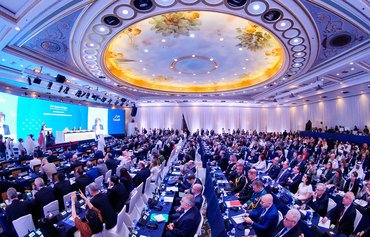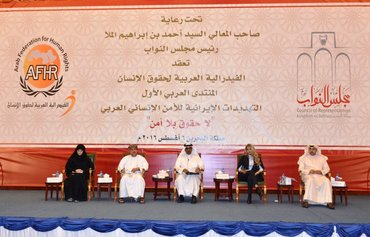The International Institute for Strategic Studies (IISS) Manama Dialogue Forum 2017 recently brought together representatives of security establishments from the East and West in Bahrain to discuss a range of security issues.
The 13th regional security summit, held December 8th to 10th in the Bahraini capital, offered representatives from the Gulf and Middle East a chance to meet with their counterparts in Europe, North America and Asia.
Over the course of three days, forum participants took part in a series of open and closed-door sessions to look at various issues of regional concern.
These included discussions on the 2018 Iraqi elections and the impetus to form a national unity government in the post "Islamic State of Iraq and Syria" (ISIS) era, the nature of the conflict in Yemen, and diplomatic challenges in Syria.
![Over the course of three days, participants at the IISS Manama Dialogue Forum 2017 took part in open and closed sessions to discuss various aspects of regional security. [Mohammed al-Jayousi/Al-Mashareq]](/cnmi_am/images/2017/12/13/10689-Manama-forum-2017-600_384.jpg)
Over the course of three days, participants at the IISS Manama Dialogue Forum 2017 took part in open and closed sessions to discuss various aspects of regional security. [Mohammed al-Jayousi/Al-Mashareq]
Iraq's recent declaration of victory against ISIS does not mean the elimination of extremism, political analysts told Al-Mashareq, but marks the start of a new phase of maintaining the security and political gains in the region.
This will require redoubled security efforts in order to succeed, they noted.
The discussions also addressed the geopolitical rivalry between Saudi Arabia and Iran, and the economic dimensions of security.
Participants discussed the need to establish a collective security framework in order to sever channels of funding for terrorism, eliminate terror cells and curb violent extremism -- some of which is perpetrated by Iran-backed groups.
Curbing Iran's ambitions
Iran has "taken advantage of its neighbours’ weakness" to expand its interests and influence in the region, said summit participant Ibtisam al-Kutbi, head of the Emirates Policy Centre and professor of political science at UAE University.
"But it does not in fact have inner strength," al-Kutbi said, speaking to Al-Mashareq from the sidelines of the conference. "[Iran] has major economic and political failures, and has greatly failed to build internal power."
"The weakness of its neighbours has encouraged Iran to expand and create agents that act against the state in several areas and countries across the region," she said.
This has enabled it to further its imperialist ambitions and expansionist objectives, she added.
In response, al-Kutbi said, regional and international efforts must be unified against the actions of Iran's Islamic Revolutionary Guards Corps (IRGC) in Iraq, Syria and Yemen, "and even its attempts to infiltrate into Lebanon".
Stable security structure
"Building a stable security structure is essential to the future of this region," Lebanese political analyst Raghida Dargham told Al-Mashareq.
"The search for such a structure must begin locally, in the region -- in the Arab world and in the Gulf -- in order to understand the general concept and how to build it regionally and participate in it globally," she said.
The US position is close to the positions of the Gulf Co-operation Council countries, which have been a key partner in confronting Iran, she noted.
The US-Arab relationship should be viewed from the perspective of the new partnership and with an emphasis on strategic relations, defining them with certainty with regard to Iran in particular, Dargham said.
"Hizbullah and the Houthis (Ansarallah) must be confronted with political, military and diplomatic work," she said.
These Iran-backed militias must be disarmed "to ensure the region’s stability and the return of political, security and social conditions to normal in Yemen, Lebanon, Iraq and Syria", she added.
Additionally, she said, regional efforts in the fight against terrorism must be supported by international efforts to maximise gains on the ground and mimimise human and material losses.
Restoring 'Arab identity'
The Arab identity has been "badly damaged" by the actions of violent extremist groups, Bahraini political writer and researcher Abdullah al-Junaid told Al-Mashareq.
ISIS and Hizbullah have distorted the image of Islam, he said, by "linking it to the ugliest forms of extremism and bloody violence".
"What we need now is to confront terrorism as a culture, and not only in the security and military aspect," he said.
"The countries of the region have a great responsibility in creating stability themselves without marginalising the role of any country," he added. "All countries have security roles and duties they must commit to."
"Iran continues to pose a major nightmare for Arab dreams of stability and security as it continues to interfere in its neighbours’ internal affairs," he said.
It has continued to mobilise fighters in IRGC camps across the region "to create chaos in the Arab world", he said, "with the goal of becoming the greatest regional power at the expense of its neighbouring countries".

![The International Institute for Strategic Studies Manama Dialogue Forum 2017 brought together representatives of security establishments from the Gulf, Middle East, Europe, North America and Asia in the Bahraini capital from December 8th to 10th. [Mohammed al-Jayousi/Al-Mashareq]](/cnmi_am/images/2017/12/13/10688-Manama-security-conference-600_384.jpg)







The terrorist, disbanded Muslim Brotherhood which is led by ousted Morsi must be punished. They have nothing to do with Muslims, and will never be victorious because they’re cowards. We say of them, ‘O, God, we seek shelter in You to spare us their evil, O, God, amen!”
Reply1 Comment(s)